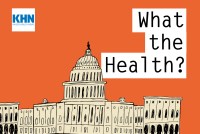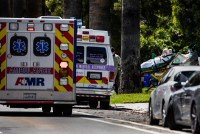Latest Morning Briefing Stories
Esfuerzo comunitario para que trabajadores agrícolas reciban el refuerzo de la vacuna contra covid
La necesidad de recibir el refuerzo de las vacunas, y la amenaza inminente de la variante omicron, han hecho que la comunicación sobre covid sea más desafiante en la comunidad de los campos.
Journalists Review Public Views on Vaccines and the Arc of Covid Testing
KHN and California Healthline staff made the rounds on national and local media this week to discuss their stories. Here’s a collection of their appearances.
Vaccine Promoters Struggle to Get People Boosted in California’s Fields
Stressed vaccine communicators battle anti-vaccine propaganda while seeking to persuade Latino farmworkers to get covid boosters.
KHN’s ‘What the Health?’: Oh, Oh, Omicron
Even before the omicron variant of covid starts to spread widely in the U.S., hospitals are filling up with post-holiday delta cases. Meanwhile, the Supreme Court signals — loudly — that 2022 will be the year it rolls back abortion rights in a big way. Margot Sanger-Katz of The New York Times, Alice Miranda Ollstein of Politico and Mary Ellen McIntire of CQ Roll Call join KHN’s Julie Rovner to discuss these issues and more.
After ‘Truly Appalling’ Death Toll in Nursing Homes, California Rethinks Their Funding
California wants to hold nursing homes accountable for the quality of care they provide by tying Medicaid funding more directly to performance. But the nursing home industry, an influential player in the Capitol, is gearing up for a fight.
Colorado Hospitals in ‘Critical Condition’ as State Weathers Another Surge
Patients with other ailments are frustrated, and nurses and doctors are stressed and burned out, as unvaccinated covid-19 patients fill ICU and acute care beds.
With Overdose Deaths Surging, Advocates on the Ground Push for Over-the-Counter Naloxone
Harm-reduction groups say that requiring a doctor to sign off on their orders of the overdose reversal drug is one of the biggest barriers they face in obtaining the lifesaving medication.
Con más muertes por sobredosis, defensores claman por una naloxona de venta libre
La administración Biden ha destinado $30 millones a programas de reducción de daños por adicciones. Pero defensores dicen que la principal barrera es que la naloxona sigue siendo de venta bajo receta.
How LA, Calling the Shots on School Vaccine Mandates, Can Lead the Way on Covid Rules
In the middle of a measles outbreak in 1977, the Los Angeles school system required students to be inoculated or stay out of class. Other school systems followed the practice. Will it work again now that the county is insisting that teens have their shots against covid?
Journalists Discuss Omicron, Public Health, Culturally Competent Care
KHN and California Healthline staff made the rounds on national and local media this week to discuss their stories. Here’s a collection of their appearances.












